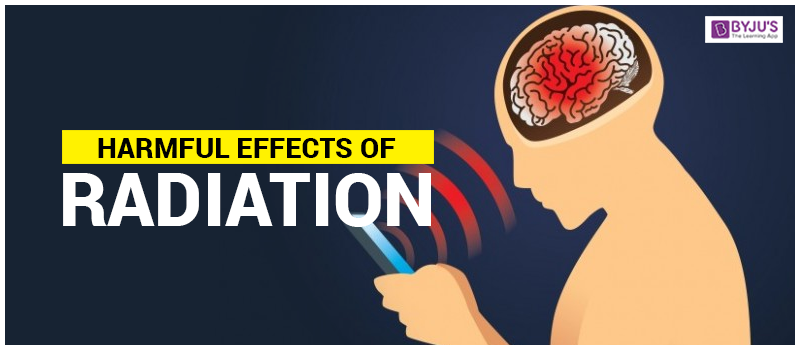What is Radiation?
Radiation can be defined as
The transmission or emission of energy in the form of particles or waves through a material medium or space.
Radiation includes:
- Electromagnetic radiation such as radio waves, heat, x-rays, gamma radiation, and even visible light.
- Particle radiation such as alpha radiation, neutron radiation, and beta radiation
- Acoustic radiation such as seismic waves, sound, and ultrasound
- Gravitational radiation
Radiation poisoning occurs when a radioactive material releases particles which enter a person’s body and cause damage. The different characteristics of the radioactive substances are different. In different ways they can harm and help people and some are more dangerous than others.
Table of Content
- Harmful Effects of Radiation
- Recommended Videos on Effect of Radiation
- Facts on Effects of Radiation
- Effects of Radiation Pollution
- Protective Measures
- Frequently Asked Questions – FAQs
Harmful Effects of Radiation
Radiation can be categorized into non-ionizing or ionizing depending on the radiated particle’s energy. Radioactive materials that emit α, β, or γ radiation are the common sources of ionizing radiation. Visible light, microwaves, infrared light, are the common sources of non-ionizing radiation. Both types of radiation are harmful to health even though they have few advantages.

Radiation exposure can have different effects depending on the dose received. A key factor in determining the health effects is whether it is chronic or acute. When a dose of radiation is received at once, then it can be called an acute exposure, and when a small dose of radiation is exposed for a long period then it is chronic exposure.
Health effects of radiation can be classified into two categories: threshold effects and non-threshold effects. Threshold effects appear after a certain level of radiation exposure is reached and enough cells have been damaged to make the effect apparent. Non-threshold effects can occur at lower levels of radiation exposure.
When considering radiation ‘s health effects on the human body, one method is to consider the deterministic effects and stochastic effects separately. Those two effects are compiled in the figure above. Deterministic effects do not appear unless the radiation exceeds a certain level has been exposed. Most of the deterministic effects are classified into acute disorders, the symptoms of which appear within several weeks of exposure.
Here are a few common health effects or harmful effects of radiation on the human body.
1. Hair
Loss of hair fall occurs when exposure to radiation is higher than 200 rems.
2. Heart and Brain
Intense exposure to radiation from 1000 to 5000 rems will affect the functioning of the heart. Radiation kills nerve cells and small blood vessels of heart which may cause immediate death. Brain cells are affected if the radiation exposure is greater than 5000 rems.
3. Thyroid
Certain body parts are affected specifically when exposed to different types of radiation sources. The thyroid gland may be affected when exposed to radioactive iodine. If exposed to a considerable amount of radioactive iodine, whole or part of the thyroid can be affected.
4. Blood System
A number of lymphocytic cells present in the blood will be reduced if a person is exposed to 100 rems. This may cause several immune problems. This is termed as mild radiation sickness. As per the reports from Nagasaki and Hiroshima, symptoms may be present more than ten years from that exposure.
5. Reproductive Tract
As the cells of the reproductive tract divide fastly, these are more prone to be affected even if the exposure is not more than 200 rems.
Recommended Videos on Effect of Radiation

Facts on Effects of Radiation
- Radiation is around us, and is used in many applications safely.
- The radiation effects can be mild or life-threatening, depending on the dose. All sources of radiation poisoning can be nuclear accidents, the work environment, and some medical treatment.
- There is no cure, but barriers can prevent exposure and some medicines can remove some of the body’s radiation.
- Anyone who thinks they are radiation sensitive will seek medical attention as soon as possible.
Effects of Radiation Pollution
In reproductive cells, ionizing radiation damages the genetic material and results in mutations that are transmitted from generation to generation. The mutagenic effects of radiation were first recognized in the 1920s, and since that time radiation has been used as an important means in genetic research to obtain new mutations in experimental organisms.
The radiation ‘s genetic effects are reflected not in individuals irradiated but in their immediate or distant offspring. Due to the duration of the human life cycle, the time lag is great, and massive epidemiological studies with long-term follow-up are needed to gather sufficient data for statistical analysis.
Protective Measures
The objective of radiation protection is to protect people and the environment against the harmful effects of ionizing radiation. This is achieved through a process called risk assessment which involves
- Identifying the hazard
- estimating the size of the risk and
- Assessing its importance in comparison with other risks.
The results of the risk assessment should be recorded appropriately and used as the basis for making decisions about how to manage the risk. Finally, each risk assessment needs to be reviewed and updated periodically and when new equipment or work practices are introduced.
Frequently Asked Questions – FAQs
Does radiation lower the immune system?
Radiation therapies can irritate the skin, causing small breaks that could allow entry of bacteria and germs. Radiation is more likely to weaken your immune system if it is directed to the bones, particularly the bones in your pelvis where the marrow functions as a factory for blood cells.
What materials can block radiation?
Non-lead shielding materials are produced with additives and binders mixed with attenuating heavy metals which fall into the same material category as lead which also absorbs or blocks radiation. Such metals may include tin (Sn), antimony (Sb), bismuth (Bi), tungsten (W), or other elements.
How long does it take to recover from radiation therapy?
Most side effects usually go away within a couple of weeks to two months after treatment is complete. But after treatment is over, some side effects may continue because it takes time for healthy cells to recover from the radiation therapy effects. Late side effects may occur months or years following treatment.
How does radiation attack the body?
In living organisms, ionizing radiation will impact the atoms, thereby posing a health risk by destroying tissue and DNA in the genes. Has enough energy to impact the atoms of living cells, thus destroying their genetic material ( DNA). It can also have long-term effects on well-being, such as cancer and cardiovascular disease.
What are the effects of radiation poisoning?
A very high level of radiation exposure within a short period of time can cause symptoms such as nausea and vomiting within hours, which can also lead to death in the days or weeks that follow. This is called the acute radiation syndrome, commonly referred to as “radiation sickness.”
What is the most common acute side effect of radiation treatment?
Fatigue can cause exhaustion, both physical, emotional and mental. This tiredness is not induced by overactivity and is not necessarily relieved by rest, but many people would recommend rest as a way to alleviate tiredness. The most common acute side effect of radiation therapy is fatigue.
What does radiation feel like?
Radiation sickness happens when an individual is exposed to a high dose of ionizing radiation. The severity of the symptoms and illness depends on the type and amount of radiation, the exposure length and the part of the body that is exposed. Symptoms initially include nausea , vomiting, headache and diarrhoea.
What should you avoid during radiation?
During radiation therapy, foods to avoid or reduce include sodium (salt), added sugars, solid (saturated) fats, and excess alcohol. In all diets a bit of salt is needed. Your health care provider or dietitian may recommend how much salt you should eat based on your medical history.
What happens to the body after radiation exposure?
Radiation damages your intestines and stomach, blood vessels, and bone marrow, which makes blood cells. Damage to the bone marrow increases the amount of white blood cells in the body that battle the disease. As a result, infections or internal bleeding kill the majority of people who die from radiation sickness.
What should you do if you are exposed to radiation?
The Centres for Disease Control and Prevention (CDC) may recommend that you stay inside your home during a radiation emergency, rather than evacuating. That is because some harmful radiation will actually be absorbed by your home walls.
These were some harmful effects of radiation. Stay tuned with BYJU’S to learn more about radiation and other interesting topics.

Comments